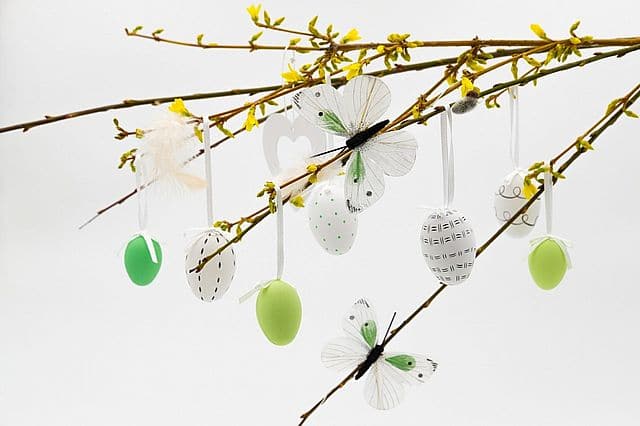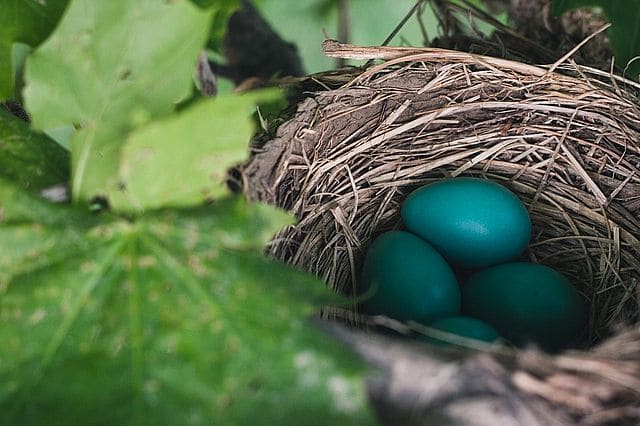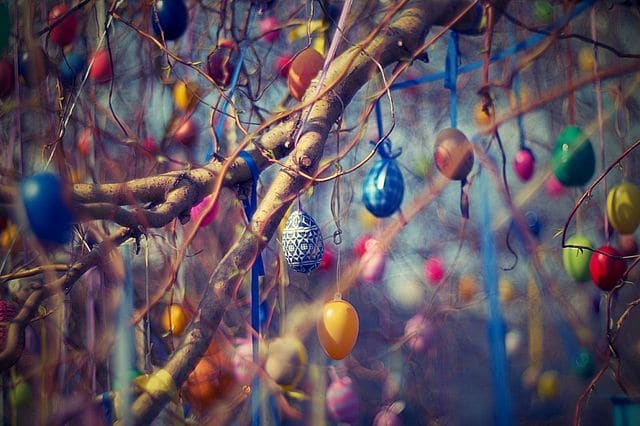Easter in Germany (Ostern) symbolises the renewal of spring and the victory over winter (a spoiler for Games of Throne fans). The long weekend is a time of celebrations. Their origin is not necessarily religious. Many are inherited from pagan customs of Celtic and Scandinavian origin. The festivities celebrate budding nature and are a source of inspiration full of joy, colour…and hard-boiled eggs.

Osterstrauch or Osterbaum, Eggs on Trees
How can we symbolise the renewal of life with the arrival of spring? By adorning the buds of trees with decorated eggs.
Two weeks before Easter, the white eggs are hollowed out, a hole on top, a hole underneath. The washed and dried shell is then painted in an overflow of colourful patterns. The decorated eggs are hung in gardens on bud-bearing branches: forsythia branches, hazelnut or willow branches. This beautification of the gardens offers a perfect setting for walks.
Egg decoration provides a great cross-generational activity to fill the holiday schedule. On the eve of Easter, the DIY workshop continues! The family prepares straw or moss nests (still nature!) that they hide in gardens (or houses in the absence of a green patch) for the Easter hare to lay its eggs there.

Osterhase, The Easter Hare
Catholic countries have eggs distributed by bells from Rome. From a logistical point of view, the undertaking is very complicated. On the one hand, chocolate is not a Roman tradition. On the other hand, the law of gravity compromises the integrity of chocolate sweets when they fall.
In German-speaking countries, it is the Easter hare (Osterhase) that distributes the eggs. The hare – Easter Bunny for English speakers – is the pagan symbol of fertility. It is logical that he is in charge of distributing the eggs, an allegory of spring germination. Moreover, it seems to us that the hare has a better knowledge of the terrain to find the optimal hiding places.

Ostereiersuche, The Hunt for Hard-Boiled Eggs!
Once the hare has done his job, the egg hunt begins on Easter Sunday.
But Charlie and his chocolate factory can review their marketing strategies. While chocolate candies are gaining ground, the German tradition is that the osterhase hides hard-boiled eggs. Hard-boiled eggs tinted with primary, solid colours.
Indeed, finding the eggs is only a prerequisite. The highlight of the hunt is the hard-boiled egg battle! The rule is based on the marble game or the technique known as the Tac (or Touch Touch). It’s about aiming at the opponent’s egg and the one who breaks the other’s shell has won.
How to Get in the Mood ?
VivaLing coaches make sure that their student learn as much about language as about its cultural environment. There is nothing better than practice to immerse yourself in tradition, and even better if that practice respects nature and protects our friend Osterhase, the Easter hare. While you prepare your eggs, VivaLing is very happy to wish you :
Frohe Ostern!





